This woodworking project is about wood fence plans. If you want to build a nice fence to protect your property and to enhance its look, you can save a significant amount if money by getting the job done by yourself. Plan everything with attention and make sure you check out the rest of the projects before starting the actual construction. Pour durable footings and level everything accurately.
Before starting the actual construction of the wooden wood fence, we recommend you to choose the right design and proper plans for your needs. If you want to make a bold statement, then you should consider using 6×6 posts. In addition, invest in quality materials such as cedar, pine or redwood, as regular pressure-treated lumber might look a little too dull, although it is the most affordable choice. See all my Premium Plans HERE.
Projects made from these plans
Building a wooden fence
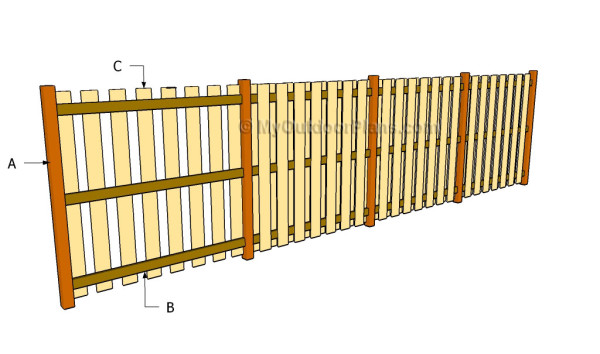
Building a wood fence
Cut & Shopping Lists
- A – 4×4 lumber POSTS
- B – 2×4 lumber RAILS
- C – 5/8″x5 1/2″ lumber PICKET FENCING
Tools
![]() Hammer, Tape measure, Framing square
Hammer, Tape measure, Framing square
![]() Miter saw, Drill machinery, Screwdriver, Sander, Post-hole digger
Miter saw, Drill machinery, Screwdriver, Sander, Post-hole digger
Time
![]() One weekend
One weekend
Related
[toggle title=”Footing Size”]
| Fence Height (feet) | Footing Diameter x Depth (inches) |
| 4 | 8 x 24 |
| 5 | 8 x 24 |
| 6 | 8 x 30 |
| 7 | 9 x 36 |
| 8 | 10 x 42 |
| 9 | 11 x 48 |
| 10 | 12 x 48 |
| 11 | 14 x 48 |
| 12 | 14 x 48 |
[/toggle]
Wood Fence Plans
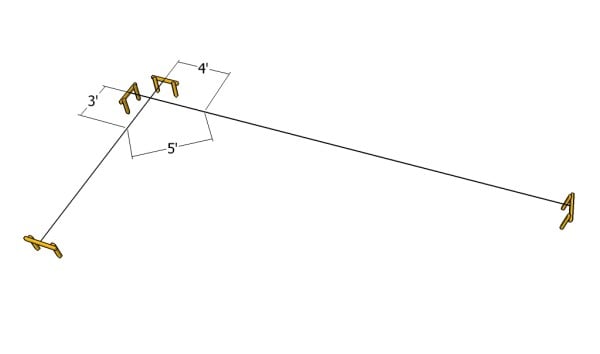
Laying out the fence
The first step of the woodworking project is to lay out the fence in a professional manner. If the fence runs straight or follows a corner shape, you need to plot it properly. Therefore, layout end, corner and gateposts.
Top Tip: Use batterboards and string to layout the wood fence accurately. Apply the 3-4-5 rule to the corners, to make sure the corners are right-angled, before fitting the posts.
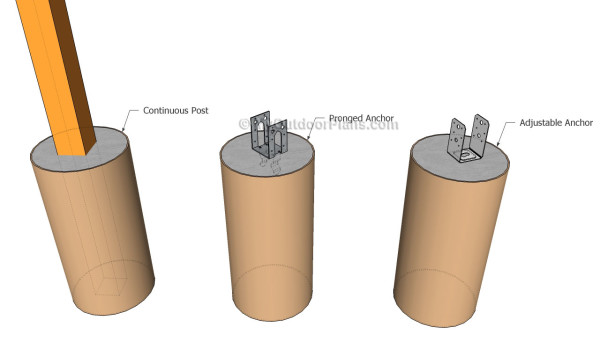
Anchoring the post into concrete
The next step of the project is to set the wooden posts into place. Therefore, you can choose from several options: setting the posts into concrete or using post anchors. In the first case, you need to 3′ deep holes and fit tube forms. Set the posts into place, plumb them and secure them temporarily with braces.
Top Tip: Fill the tube forms with concrete and let it dry out. In the second case, fit the anchors into concrete and fit the posts with spirit level.
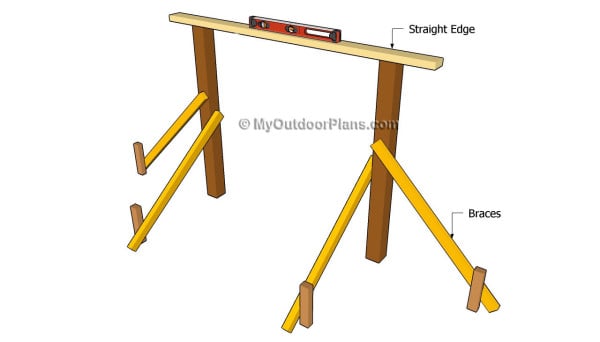
Installing the posts
The next step of the woodworking project is to set the posts into place using temporarily braces. Use a spirit level to make sure the posts are plumb, as well as if the top of the posts are horizontal. Usually the posts are 6′ or 8′ spaced one from another.
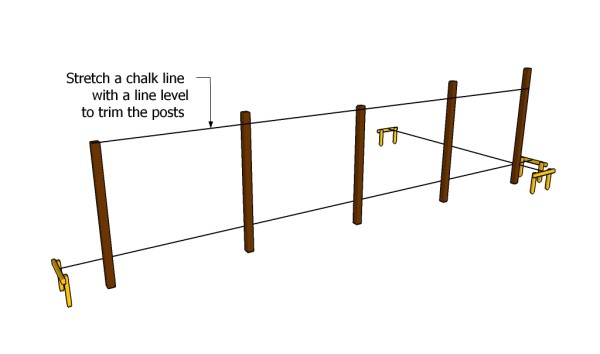
Trimming the posts
If the posts have decorative ends, you need to adjust their size prior to setting them into concrete. Otherwise, mark one end at the desired height and stretch a chalk line to the other end post and level it with a line level.
If the fence is long, you should work on just a few posts at a time. Use a guide to support the circular saw, while you trim each post. Finish the job with a crosscut handsaw and smooth the edge with fine-grit sandpaper.
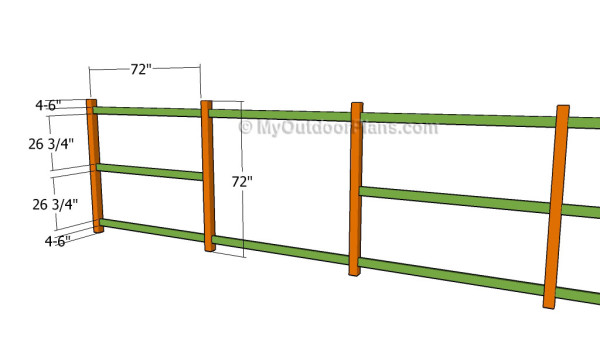
Hanging the rails between the posts
The next step of the project is to hang the rails between the posts. As you can easily notice in the diagram, we recommend you to build the rails out of 2×4 lumber.
Top Tip: If the fence is 6′ or taller, we recommend you to use three rows of rails. Make sure the corners are square and plumb the posts with a spirit level. Make sure the rails are horizontal before nailing them to the posts.
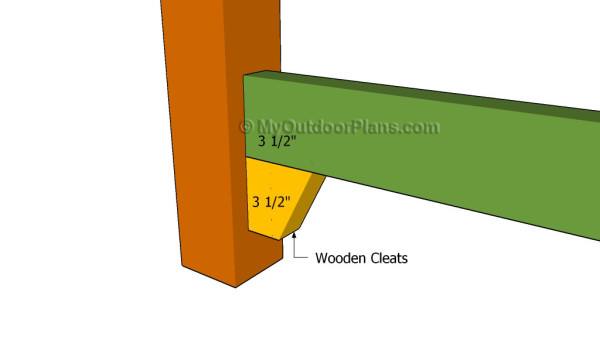
Fitting the wooden cleats
There are several methods to secure the rails to the posts. On one hand, you can fasten two cleats under the rail to the posts, using 3″ nails. Place the rails on the cleats and drive in nails or screws at an angle through the rails into the cleats and into the posts.
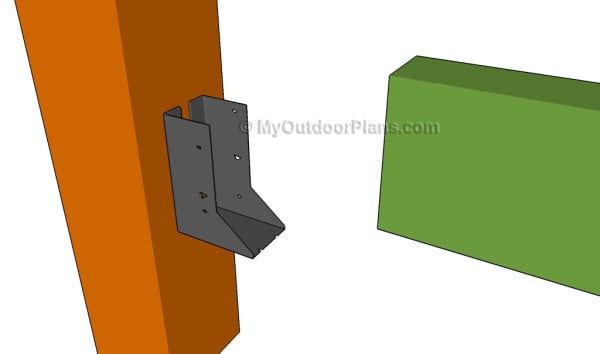
Fitting the metal hangers
Alternatively, you could invest into metal hangers. As you can easily notice in the diagram, we recommend you to nails the hangers to the posts, making sure they are properly aligned and horizontal. Slide the rails into the hangers and nail them to the side flanges to the rail.
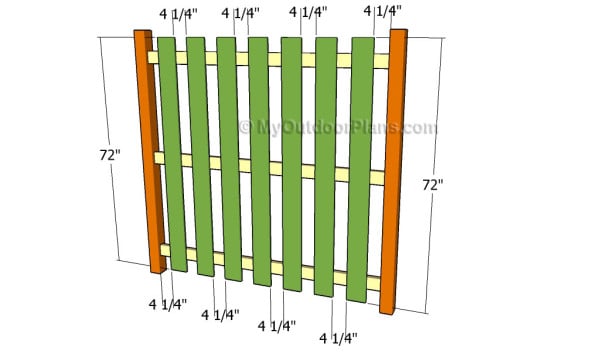
Attaching the picket fences
Next, fit the picket fencing to the rails between the posts. As you can easily notice in the plans, we recommend you to place the pickets equally-spaced. Use a wood block to create even gaps between the pickets. Adjust the distance between the pickets to suit your needs.
Align the first slats, check if it is plumb and adjust it if necessary. Hang the spacer between the slats before inserting the 2″ deck screws. Check with a level every three boards to make sure they are plumb.
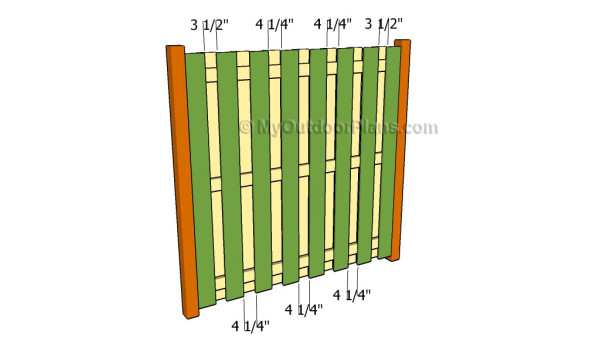
Attaching the picket fencing on the opposite side
If you want to enhance the look of the fence, we recommend you to attach wooden pickets to the opposite face of the fence. Make sure you align everything with attention and you secure them into place using 2″ screws/nails.
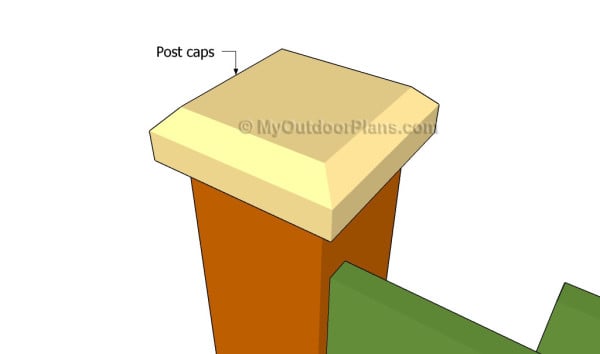
Fitting the post caps
One of the last steps of the woodworking project is to attach the post caps to the wooden fence. As you can notice in the diagram, you need to center the caps to the post and lock them tightly using waterproof glue and finishing nails.
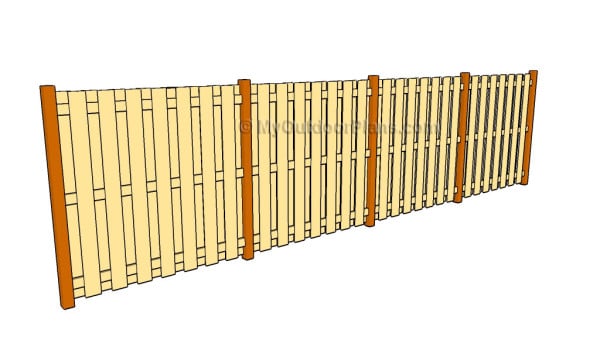
Wooden fence plans
Last but not least, you have to take care of the finishing touches. Therefore, fill the holes and the cracks with wood filler and let it dry out for several hours, before sanding the surface with 120-grit sandpaper.
Top Tip: Protect the wooden components from rot by applying several coats of paint. Make sure the color matches the style of your property before applying the paint.
This woodworking project was about wooden fence plans. If you want to see more outdoor plans, we recommend you to check out the rest of our step by step projects.
